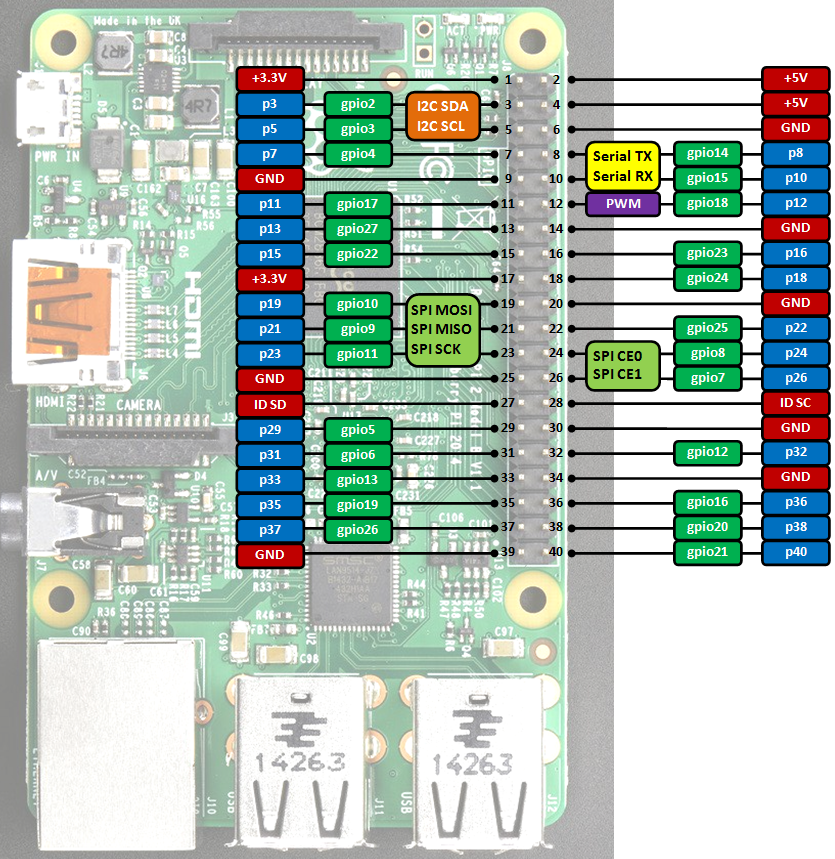mbed API for Raspberry Pi boards.
mbedPi
This is an attempt to implement a limited number of mbed APIs for Raspberry Pi single-board computers. The project was inspired by and based on the arduPi library developed for the Arduino by Cooking Hacks .
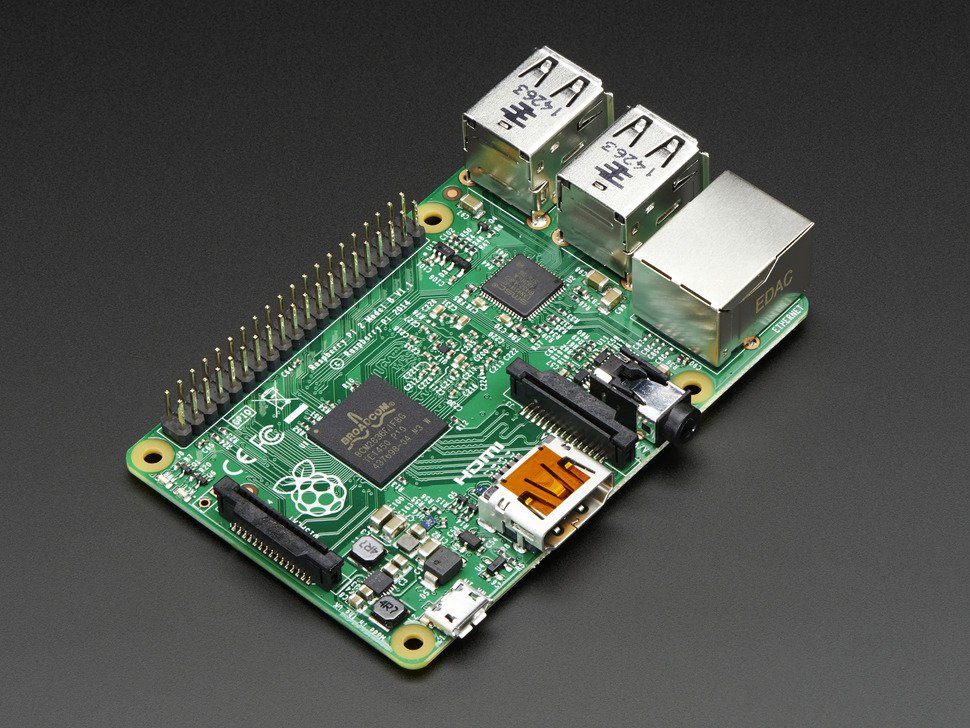
Specifications
- Chip: Broadcom BCM2836 SoC
- Core architecture: Quad-core ARM Cortex-A7
- CPU frequency: 900 MHz
- GPU: Dual Core VideoCore IV® Multimedia Co-Processor
- Memory: 1GB LPDDR2
- Operating System: Boots from Micro SD card, running a version of the Linux operating system
- Power: Micro USB socket 5V, 2A
Connectors
- Ethernet: 10/100 BaseT Ethernet socket
- Video Output: HDMI (rev 1.3 & 1.4)
- Audio Output: 3.5mm jack, HDMI
- USB: 4 x USB 2.0 Connector
- GPIO Connector: 40-pin 2.54 mm (100 mil) expansion header: 2x20 strip providing 27 GPIO pins as well as +3.3 V, +5 V and GND supply lines
- Camera Connector: 15-pin MIPI Camera Serial Interface (CSI-2)
- JTAG: Not populated
- Display Connector: Display Serial Interface (DSI) 15 way flat flex cable connector with two data lanes and a clock lane
- Memory Card Slot: Micro SDIO
GPIO connector pinout
Information
Only the labels printed in blue/white or green/white (i.e. p3, gpio2 ...) must be used in your code. The other labels are given as information (alternate-functions, power pins, ...).
Building programs for the Raspberry Pi with mbedPi
I use Qt Creator for development, however you can use any other IDE available on the Raspberry Pi (e.g. Geany) if you like. For a quick try:
- Install Qt and the Qt Creator onto your Raspberry Pi. Then create a new "Blinky" Plain non-Qt C++ Project as follows:
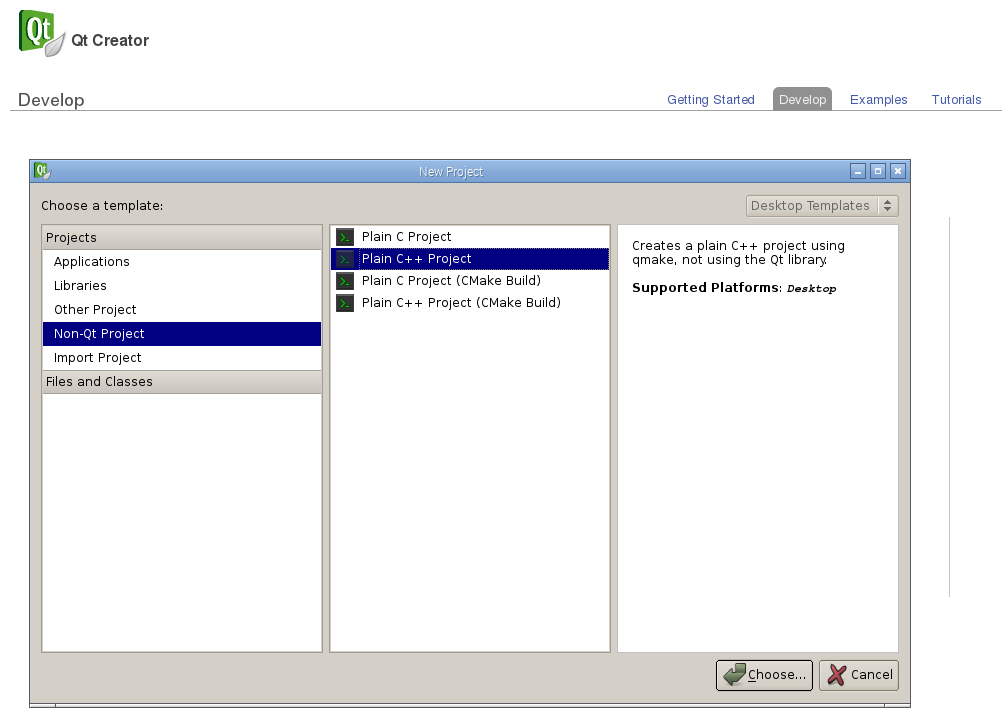
- Change the main code as below:
main.cpp
#include "mbedPi.h"
int main()
{
DigitalOut myled(p7);
while(1) {
myled = 1; // LED is ON
wait(0.2); // 200 ms
myled = 0; // LED is OFF
wait(1.0); // 1 sec
printf("Blink\r\n");
}
}
- Copy the mbedPi.zip file into your project's folder and unzip.
- Add the mbedPi.h and mbedPi.cpp files to your project by right clicking on the "Blinky" project and then clicking on the "Add Existing Files..." option in the local menu:
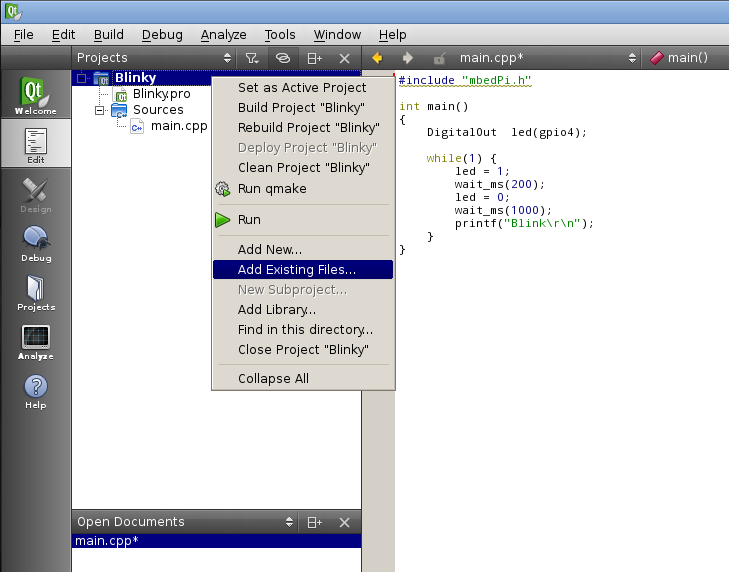
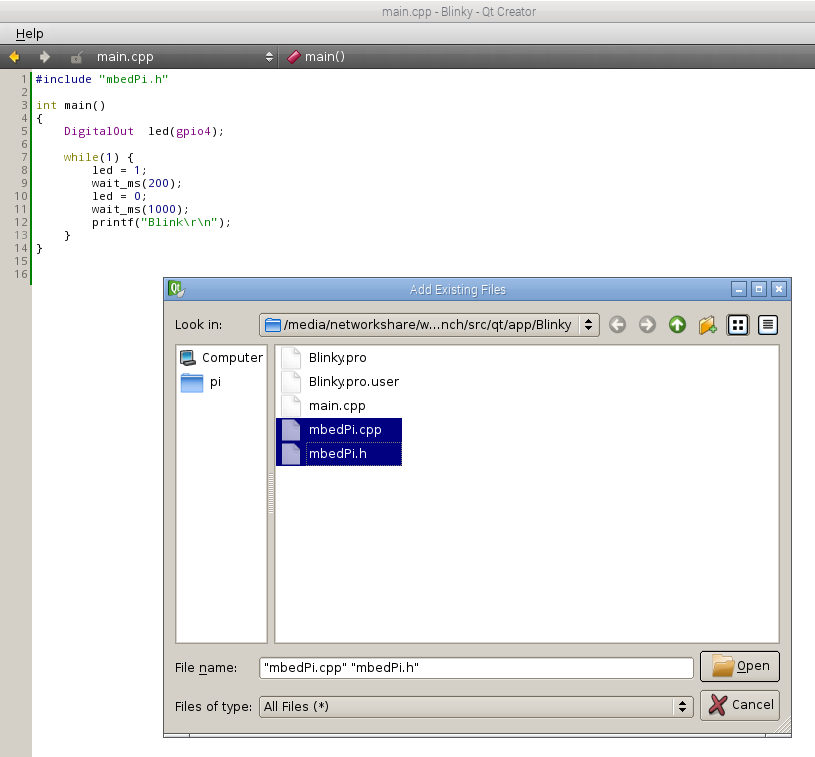
- Double click on Blinky.pro to open it for editing and add new libraries by inserting a new line as follows:
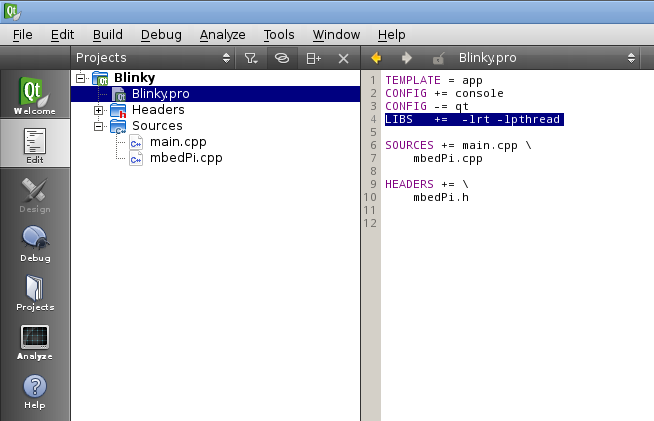
- Compile the project.
- Connect an LED through a 1k resistor to pin 7 and the ground on the Raspberry Pi GPIO connector.
- Run the binary as sudo (sudo ./Blinky) and you should see the LED blinking.

- Press Ctrl+c to stop running the application.
mbedPi.cpp
- Committer:
- hudakz
- Date:
- 2016-10-18
- Revision:
- 0:91392e1f8551
File content as of revision 0:91392e1f8551:
/*
* Copyright (C) 2016 Zoltan Hudak
* hudakz@outlook.com
*
* Portions Copyright (C) Libelium Comunicaciones Distribuidas S.L.
* http://www.libelium.com
*
* This program is free software: you can redistribute it and/or modify
* it under the terms of the GNU General Public License as published by
* the Free Software Foundation, either version 3 of the License, or
* (at your option) any later version.
*
* This program is distributed in the hope that it will be useful,
* but WITHOUT ANY WARRANTY; without even the implied warranty of
* MERCHANTABILITY or FITNESS FOR A PARTICULAR PURPOSE. See the
* GNU General Public License for more details.
*
* You should have received a copy of the GNU General Public License
* along with this program. If not, see <http://www.gnu.org/licenses/>.
*
* Version 1.0
*/
//
#include "mbedPi.h"
#include <stdarg.h>
/*$off*/
struct bcm2835_peripheral gpio = { GPIO_BASE };
struct bcm2835_peripheral bsc_rev1 = { IOBASE + 0X205000 };
struct bcm2835_peripheral bsc_rev2 = { IOBASE + 0X804000 };
struct bcm2835_peripheral bsc0;
volatile uint32_t* bcm2835_bsc1;
void* spi0 = MAP_FAILED;
static uint8_t* spi0Mem = NULL;
pthread_t idThread2;
pthread_t idThread3;
pthread_t idThread4;
pthread_t idThread5;
pthread_t idThread6;
pthread_t idThread7;
pthread_t idThread8;
pthread_t idThread9;
pthread_t idThread10;
pthread_t idThread11;
pthread_t idThread12;
pthread_t idThread13;
pthread_t idThread14;
pthread_t idThread15;
pthread_t idThread16;
pthread_t idThread17;
pthread_t idThread18;
pthread_t idThread19;
pthread_t idThread20;
pthread_t idThread21;
pthread_t idThread22;
pthread_t idThread23;
pthread_t idThread24;
pthread_t idThread25;
pthread_t idThread26;
pthread_t idThread27;
pthread_t* idThreads[26] =
{
&idThread2,
&idThread3,
&idThread4,
&idThread5,
&idThread6,
&idThread7,
&idThread8,
&idThread9,
&idThread10,
&idThread11,
&idThread12,
&idThread13,
&idThread14,
&idThread15,
&idThread16,
&idThread17,
&idThread18,
&idThread19,
&idThread20,
&idThread21,
&idThread22,
&idThread23,
&idThread24,
&idThread25,
&idThread26,
&idThread27
};
timeval start_program, end_point;
/*$on*/
/**
* @brief
* @note
* @param
* @retval
*/
void wait(float s) {
unistd::usleep(s * 1000 * 1000);
}
/**
* @brief
* @note
* @param
* @retval
*/
void wait_ms(int ms) {
unistd::usleep(ms * 1000);
}
/**
* @brief
* @note
* @param
* @retval
*/
void wait_us(int us) {
if(us > 100) {
struct timespec tim, tim2;
tim.tv_sec = 0;
tim.tv_nsec = us * 1000;
if(nanosleep(&tim, &tim2) < 0) {
fprintf(stderr, "Nano sleep system call failed \n");
exit(1);
}
}
else {
struct timeval tNow, tLong, tEnd;
gettimeofday(&tNow, NULL);
tLong.tv_sec = us / 1000000;
tLong.tv_usec = us % 1000000;
timeradd(&tNow, &tLong, &tEnd);
while(timercmp(&tNow, &tEnd, < ))
gettimeofday(&tNow, NULL);
}
}
/**
* @brief
* @note
* @param
* @retval
*/
Serial::Serial(void) {
//if((tx == gpio14) && (tx == gpio15)) {
REV = getBoardRev();
serialPort = "/dev/ttyAMA0";
timeOut = 1000;
//baud(9600);
//}
}
/**
* @brief
* @note
* @param
* @retval
*/
void Serial::baud(int baudrate) {
switch(baudrate) {
case 50:
speed = B50;
break;
case 75:
speed = B75;
break;
case 110:
speed = B110;
break;
case 134:
speed = B134;
break;
case 150:
speed = B150;
break;
case 200:
speed = B200;
break;
case 300:
speed = B300;
break;
case 600:
speed = B600;
break;
case 1200:
speed = B1200;
break;
case 1800:
speed = B1800;
break;
case 2400:
speed = B2400;
break;
case 9600:
speed = B9600;
break;
case 19200:
speed = B19200;
break;
case 38400:
speed = B38400;
break;
case 57600:
speed = B57600;
break;
case 115200:
speed = B115200;
break;
default:
speed = B230400;
break;
}
if((sd = open(serialPort, O_RDWR | O_NOCTTY | O_NDELAY | O_NONBLOCK)) == -1) {
fprintf(stderr, "Unable to open the serial port %s - \n", serialPort);
exit(-1);
}
fcntl(sd, F_SETFL, O_RDWR);
tcgetattr(sd, &options);
cfmakeraw(&options);
cfsetispeed(&options, speed);
cfsetospeed(&options, speed);
options.c_cflag |= (CLOCAL | CREAD);
options.c_cflag &= ~PARENB;
options.c_cflag &= ~CSTOPB;
options.c_cflag &= ~CSIZE;
options.c_cflag |= CS8;
options.c_lflag &= ~(ICANON | ECHO | ECHOE | ISIG);
options.c_oflag &= ~OPOST;
tcsetattr(sd, TCSANOW, &options);
ioctl(sd, TIOCMGET, &status);
status |= TIOCM_DTR;
status |= TIOCM_RTS;
ioctl(sd, TIOCMSET, &status);
unistd::usleep(10000);
}
void Serial::printf(const char* format, ...) {
char *buf;
va_list args;
va_start(args, format);
vasprintf(&buf, format, args);
va_end(args);
unistd::write(sd, buf, strlen(buf));
free(buf);
}
/* Writes binary data to the serial port. This data is sent as a byte
* Returns: number of bytes written */
int Serial::write(uint8_t message) {
unistd::write(sd, &message, 1);
return 1;
}
/* Writes binary data to the serial port. This data is sent as a series
* of bytes
* Returns: number of bytes written */
int Serial::write(const char* message) {
int len = strlen(message);
unistd::write(sd, &message, len);
return len;
}
/* Writes binary data to the serial port. This data is sent as a series
* of bytes placed in an buffer. It needs the length of the buffer
* Returns: number of bytes written */
int Serial::write(char* message, int size) {
unistd::write(sd, message, size);
return size;
}
int Serial::readable(void) {
int nbytes = 0;
if(ioctl(sd, FIONREAD, &nbytes) < 0) {
fprintf(stderr, "Failed to get byte count on serial.\n");
exit(-1);
}
return (nbytes > 0 ? 1 : 0);
}
/* Reads 1 byte of incoming serial data
* Returns: first byte of incoming serial data available */
char Serial::read(void) {
unistd::read(sd, &c, 1);
return c;
}
/* Reads characters from th serial port into a buffer. The function
* terminates if the determined length has been read, or it times out
* Returns: number of bytes readed */
int Serial::readBytes(char message[], int size) {
clock_gettime(CLOCK_PROCESS_CPUTIME_ID, &time1);
int count;
for(count = 0; count < size; count++) {
if(readable())
unistd::read(sd, &message[count], 1);
clock_gettime(CLOCK_PROCESS_CPUTIME_ID, &time2);
timespec t = timeDiff(time1, time2);
if((t.tv_nsec / 1000) > timeOut)
break;
}
return count;
}
/* Reads characters from the serial buffer into an array.
* The function terminates if the terminator character is detected,
* the determined length has been read, or it times out.
* Returns: number of characters read into the buffer. */
int Serial::readBytesUntil(char character, char buffer[], int length) {
char lastReaded = character + 1; //Just to make lastReaded != character
int count = 0;
clock_gettime(CLOCK_PROCESS_CPUTIME_ID, &time1);
while(count != length && lastReaded != character) {
if(readable())
unistd::read(sd, &buffer[count], 1);
lastReaded = buffer[count];
count++;
clock_gettime(CLOCK_PROCESS_CPUTIME_ID, &time2);
timespec t = timeDiff(time1, time2);
if((t.tv_nsec / 1000) > timeOut)
break;
}
return count;
}
/**
* @brief
* @note
* @param
* @retval
*/
bool Serial::find(const char* target) {
findUntil(target, NULL);
}
/* Reads data from the serial buffer until a target string of given length
* or terminator string is found.
* Returns: true if the target string is found, false if it times out */
bool Serial::findUntil(const char* target, const char* terminal) {
int index = 0;
int termIndex = 0;
int targetLen = strlen(target);
int termLen = strlen(terminal);
char readed;
timespec t;
clock_gettime(CLOCK_PROCESS_CPUTIME_ID, &time1);
if(*target == 0)
return true; // return true if target is a null string
do
{
if(readable()) {
unistd::read(sd, &readed, 1);
if(readed != target[index])
index = 0; // reset index if any char does not match
if(readed == target[index]) {
if(++index >= targetLen) {
// return true if all chars in the target match
return true;
}
}
if(termLen > 0 && c == terminal[termIndex]) {
if(++termIndex >= termLen)
return false; // return false if terminate string found before target string
}
else {
termIndex = 0;
}
}
clock_gettime(CLOCK_PROCESS_CPUTIME_ID, &time2);
t = timeDiff(time1, time2);
} while((t.tv_nsec / 1000) <= timeOut);
return false;
}
/* returns the first valid (long) integer value from the current position.
* initial characters that are not digits (or the minus sign) are skipped
* function is terminated by the first character that is not a digit. */
long Serial::parseInt(void) {
bool isNegative = false;
long value = 0;
char c;
//Skip characters until a number or - sign found
do
{
c = peek();
if(c == '-')
break;
if(c >= '0' && c <= '9')
break;
unistd::read(sd, &c, 1); // discard non-numeric
} while(1);
do
{
if(c == '-')
isNegative = true;
else
if(c >= '0' && c <= '9') // is c a digit?
value = value * 10 + c - '0';
unistd::read(sd, &c, 1); // consume the character we got with peek
c = peek();
} while(c >= '0' && c <= '9');
if(isNegative)
value = -value;
return value;
}
/**
* @brief
* @note
* @param
* @retval
*/
float Serial::parseFloat(void) {
boolean isNegative = false;
boolean isFraction = false;
long value = 0;
char c;
float fraction = 1.0;
//Skip characters until a number or - sign found
do
{
c = peek();
if(c == '-')
break;
if(c >= '0' && c <= '9')
break;
unistd::read(sd, &c, 1); // discard non-numeric
} while(1);
do
{
if(c == '-')
isNegative = true;
else
if(c == '.')
isFraction = true;
else
if(c >= '0' && c <= '9') {
// is c a digit?
value = value * 10 + c - '0';
if(isFraction)
fraction *= 0.1;
}
unistd::read(sd, &c, 1); // consume the character we got with peek
c = peek();
} while((c >= '0' && c <= '9') || (c == '.' && isFraction == false));
if(isNegative)
value = -value;
if(isFraction)
return value * fraction;
else
return value;
}
// Returns the next byte (character) of incoming serial data without removing it from the internal serial buffer.
char Serial::peek(void) {
//We obtain a pointer to FILE structure from the file descriptor sd
FILE* f = fdopen(sd, "r+");
//With a pointer to FILE we can do getc and ungetc
c = getc(f);
ungetc(c, f);
return c;
}
// Remove any data remaining on the serial buffer
void Serial::flush(void) {
while(readable()) {
unistd::read(sd, &c, 1);
}
}
/* Sets the maximum milliseconds to wait for serial data when using SerialPI::readBytes()
* The default value is set to 1000 */
void Serial::setTimeout(long millis) {
timeOut = millis;
}
//Closes serial communication
void Serial::close(void) {
unistd::close(sd);
}
/*******************
* Private methods *
*******************/
//Returns a timespec struct with the time elapsed between start and end timespecs
timespec Serial::timeDiff(timespec start, timespec end) {
timespec temp;
if((end.tv_nsec - start.tv_nsec) < 0) {
temp.tv_sec = end.tv_sec - start.tv_sec - 1;
temp.tv_nsec = 1000000000 + end.tv_nsec - start.tv_nsec;
}
else {
temp.tv_sec = end.tv_sec - start.tv_sec;
temp.tv_nsec = end.tv_nsec - start.tv_nsec;
}
return temp;
}
//Constructor
Peripheral::Peripheral(void) {
REV = getBoardRev();
if(map_peripheral(&gpio) == -1) {
printf("Failed to map the physical GPIO registers into the virtual memory space.\n");
}
memfd = -1;
//i2c_byte_wait_us = 0;
// Open the master /dev/memory device
if((memfd = open("/dev/mem", O_RDWR | O_SYNC)) < 0) {
fprintf(stderr, "bcm2835_init: Unable to open /dev/mem: %s\n", strerror(errno));
exit(1);
}
bcm2835_bsc1 = mapmem("bsc1", BLOCK_SIZE, memfd, BCM2835_BSC1_BASE);
if(bcm2835_bsc1 == MAP_FAILED)
exit(1);
// start timer
gettimeofday(&start_program, NULL);
}
//Destructor
Peripheral::~Peripheral(void) {
unmap_peripheral(&gpio);
}
/*******************
* Private methods *
*******************/
// Exposes the physical address defined in the passed structure using mmap on /dev/mem
int Peripheral::map_peripheral(struct bcm2835_peripheral* p) {
// Open /dev/mem
if((p->mem_fd = open("/dev/mem", O_RDWR | O_SYNC)) < 0) {
printf("Failed to open /dev/mem, try checking permissions.\n");
return -1;
}
p->map = mmap
(
NULL,
BLOCK_SIZE,
PROT_READ | PROT_WRITE,
MAP_SHARED,
p->mem_fd, // File descriptor to physical memory virtual file '/dev/mem'
p->addr_p // Address in physical map that we want this memory block to expose
);
if(p->map == MAP_FAILED) {
perror("mmap");
return -1;
}
p->addr = (volatile unsigned int*)p->map;
return 0;
}
/**
* @brief
* @note
* @param
* @retval
*/
void Peripheral::unmap_peripheral(struct bcm2835_peripheral* p) {
munmap(p->map, BLOCK_SIZE);
unistd::close(p->mem_fd);
}
//Constructor
I2C::I2C(void) {
// REV = getBoardRev();
// if(map_peripheral(&gpio) == -1) {
// printf("Failed to map the physical GPIO registers into the virtual memory space.\n");
// }
// memfd = -1;
i2c_byte_wait_us = 0;
// // Open the master /dev/memory device
// if((memfd = open("/dev/mem", O_RDWR | O_SYNC)) < 0) {
// fprintf(stderr, "bcm2835_init: Unable to open /dev/mem: %s\n", strerror(errno));
// exit(1);
// }
// bcm2835_bsc1 = mapmem("bsc1", BLOCK_SIZE, memfd, BCM2835_BSC1_BASE);
// if(bcm2835_bsc1 == MAP_FAILED)
// exit(1);
// // start timer
// gettimeofday(&start_program, NULL);
}
//Initiate the Wire library and join the I2C bus.
void I2C::begin(void) {
volatile uint32_t* paddr = bcm2835_bsc1 + BCM2835_BSC_DIV / 4;
// Set the I2C/BSC1 pins to the Alt 0 function to enable I2C access on them
bcm2835_gpio_fsel(RPI_V2_GPIO_P1_03, BCM2835_GPIO_FSEL_ALT0); // SDA
bcm2835_gpio_fsel(RPI_V2_GPIO_P1_05, BCM2835_GPIO_FSEL_ALT0); // SCL
// Read the clock divider register
uint16_t cdiv = bcm2835_peri_read(paddr);
// Calculate time for transmitting one byte
// 1000000 = micros seconds in a second
// 9 = Clocks per byte : 8 bits + ACK
i2c_byte_wait_us = ((float)cdiv / BCM2835_CORE_CLK_HZ) * 1000000 * 9;
}
//Begin a transmission to the I2C slave device with the given address
void I2C::beginTransmission(unsigned char address) {
// Set I2C Device Address
volatile uint32_t* paddr = bcm2835_bsc1 + BCM2835_BSC_A / 4;
bcm2835_peri_write(paddr, address);
}
//Writes data to the I2C.
void I2C::write(char data) {
char i2cdata[1];
i2cdata[0] = data;
write(i2cdata, 1);
}
//Writes data to the I2C.
uint8_t I2C::write(const char* buf, uint32_t len) {
volatile uint32_t* dlen = bcm2835_bsc1 + BCM2835_BSC_DLEN / 4;
volatile uint32_t* fifo = bcm2835_bsc1 + BCM2835_BSC_FIFO / 4;
volatile uint32_t* status = bcm2835_bsc1 + BCM2835_BSC_S / 4;
volatile uint32_t* control = bcm2835_bsc1 + BCM2835_BSC_C / 4;
uint32_t remaining = len;
uint32_t i = 0;
uint8_t reason = BCM2835_I2C_REASON_OK;
// Clear FIFO
bcm2835_peri_set_bits(control, BCM2835_BSC_C_CLEAR_1, BCM2835_BSC_C_CLEAR_1);
// Clear Status
bcm2835_peri_write_nb(status, BCM2835_BSC_S_CLKT | BCM2835_BSC_S_ERR | BCM2835_BSC_S_DONE);
// Set Data Length
bcm2835_peri_write_nb(dlen, len);
// pre populate FIFO with max buffer
while(remaining && (i < BCM2835_BSC_FIFO_SIZE)) {
bcm2835_peri_write_nb(fifo, buf[i]);
i++;
remaining--;
}
// Enable device and start transfer
bcm2835_peri_write_nb(control, BCM2835_BSC_C_I2CEN | BCM2835_BSC_C_ST);
// Transfer is over when BCM2835_BSC_S_DONE
while(!(bcm2835_peri_read_nb(status) & BCM2835_BSC_S_DONE)) {
while(remaining && (bcm2835_peri_read_nb(status) & BCM2835_BSC_S_TXD)) {
// Write to FIFO, no barrier
bcm2835_peri_write_nb(fifo, buf[i]);
i++;
remaining--;
}
}
// Received a NACK
if(bcm2835_peri_read(status) & BCM2835_BSC_S_ERR) {
reason = BCM2835_I2C_REASON_ERROR_NACK;
}
// Received Clock Stretch Timeout
else
if(bcm2835_peri_read(status) & BCM2835_BSC_S_CLKT) {
reason = BCM2835_I2C_REASON_ERROR_CLKT;
}
// Not all data is sent
else
if(remaining) {
reason = BCM2835_I2C_REASON_ERROR_DATA;
}
bcm2835_peri_set_bits(control, BCM2835_BSC_S_DONE, BCM2835_BSC_S_DONE);
return reason;
}
/**
* @brief
* @note
* @param
* @retval
*/
void I2C::endTransmission(void) {
// Set all the I2C/BSC1 pins back to input
bcm2835_gpio_fsel(RPI_V2_GPIO_P1_03, BCM2835_GPIO_FSEL_INPT); // SDA
bcm2835_gpio_fsel(RPI_V2_GPIO_P1_05, BCM2835_GPIO_FSEL_INPT); // SCL
}
//Used by the master to request bytes from a slave device
void I2C::requestFrom(unsigned char address, int quantity) {
// Set I2C Device Address
volatile uint32_t* paddr = bcm2835_bsc1 + BCM2835_BSC_A / 4;
bcm2835_peri_write(paddr, address);
i2c_bytes_to_read = quantity;
}
//Reads a byte that was transmitted from a slave device to a master after a call to WirePi::requestFrom()
unsigned char I2C::read(void) {
char buf;
i2c_bytes_to_read = 1;
read(&buf);
return (unsigned char)buf;
}
/**
* @brief
* @note
* @param
* @retval
*/
uint8_t I2C::read(char* buf) {
volatile uint32_t* dlen = bcm2835_bsc1 + BCM2835_BSC_DLEN / 4;
volatile uint32_t* fifo = bcm2835_bsc1 + BCM2835_BSC_FIFO / 4;
volatile uint32_t* status = bcm2835_bsc1 + BCM2835_BSC_S / 4;
volatile uint32_t* control = bcm2835_bsc1 + BCM2835_BSC_C / 4;
uint32_t remaining = i2c_bytes_to_read;
uint32_t i = 0;
uint8_t reason = BCM2835_I2C_REASON_OK;
// Clear FIFO
bcm2835_peri_set_bits(control, BCM2835_BSC_C_CLEAR_1, BCM2835_BSC_C_CLEAR_1);
// Clear Status
bcm2835_peri_write_nb(status, BCM2835_BSC_S_CLKT | BCM2835_BSC_S_ERR | BCM2835_BSC_S_DONE);
// Set Data Length
bcm2835_peri_write_nb(dlen, i2c_bytes_to_read);
// Start read
bcm2835_peri_write_nb(control, BCM2835_BSC_C_I2CEN | BCM2835_BSC_C_ST | BCM2835_BSC_C_READ);
// wait for transfer to complete
while(!(bcm2835_peri_read_nb(status) & BCM2835_BSC_S_DONE)) {
// we must empty the FIFO as it is populated and not use any delay
while(bcm2835_peri_read_nb(status) & BCM2835_BSC_S_RXD) {
// Read from FIFO, no barrier
buf[i] = bcm2835_peri_read_nb(fifo);
i++;
remaining--;
}
}
// transfer has finished - grab any remaining stuff in FIFO
while(remaining && (bcm2835_peri_read_nb(status) & BCM2835_BSC_S_RXD)) {
// Read from FIFO, no barrier
buf[i] = bcm2835_peri_read_nb(fifo);
i++;
remaining--;
}
// Received a NACK
if(bcm2835_peri_read(status) & BCM2835_BSC_S_ERR) {
reason = BCM2835_I2C_REASON_ERROR_NACK;
}
// Received Clock Stretch Timeout
else
if(bcm2835_peri_read(status) & BCM2835_BSC_S_CLKT) {
reason = BCM2835_I2C_REASON_ERROR_CLKT;
}
// Not all data is received
else
if(remaining) {
reason = BCM2835_I2C_REASON_ERROR_DATA;
}
bcm2835_peri_set_bits(control, BCM2835_BSC_S_DONE, BCM2835_BSC_S_DONE);
return reason;
}
// Read an number of bytes from I2C sending a repeated start after writing
// the required register. Only works if your device supports this mode
uint8_t I2C::read_rs(char* regaddr, char* buf, uint32_t len) {
volatile uint32_t* dlen = bcm2835_bsc1 + BCM2835_BSC_DLEN / 4;
volatile uint32_t* fifo = bcm2835_bsc1 + BCM2835_BSC_FIFO / 4;
volatile uint32_t* status = bcm2835_bsc1 + BCM2835_BSC_S / 4;
volatile uint32_t* control = bcm2835_bsc1 + BCM2835_BSC_C / 4;
uint32_t remaining = len;
uint32_t i = 0;
uint8_t reason = BCM2835_I2C_REASON_OK;
// Clear FIFO
bcm2835_peri_set_bits(control, BCM2835_BSC_C_CLEAR_1, BCM2835_BSC_C_CLEAR_1);
// Clear Status
bcm2835_peri_write_nb(status, BCM2835_BSC_S_CLKT | BCM2835_BSC_S_ERR | BCM2835_BSC_S_DONE);
// Set Data Length
bcm2835_peri_write_nb(dlen, 1);
// Enable device and start transfer
bcm2835_peri_write_nb(control, BCM2835_BSC_C_I2CEN);
bcm2835_peri_write_nb(fifo, regaddr[0]);
bcm2835_peri_write_nb(control, BCM2835_BSC_C_I2CEN | BCM2835_BSC_C_ST);
// poll for transfer has started
while(!(bcm2835_peri_read_nb(status) & BCM2835_BSC_S_TA)) {
// Linux may cause us to miss entire transfer stage
if(bcm2835_peri_read(status) & BCM2835_BSC_S_DONE)
break;
}
// Send a repeated start with read bit set in address
bcm2835_peri_write_nb(dlen, len);
bcm2835_peri_write_nb(control, BCM2835_BSC_C_I2CEN | BCM2835_BSC_C_ST | BCM2835_BSC_C_READ);
// Wait for write to complete and first byte back.
wait_us(i2c_byte_wait_us * 3);
// wait for transfer to complete
while(!(bcm2835_peri_read_nb(status) & BCM2835_BSC_S_DONE)) {
// we must empty the FIFO as it is populated and not use any delay
while(remaining && bcm2835_peri_read_nb(status) & BCM2835_BSC_S_RXD) {
// Read from FIFO, no barrier
buf[i] = bcm2835_peri_read_nb(fifo);
i++;
remaining--;
}
}
// transfer has finished - grab any remaining stuff in FIFO
while(remaining && (bcm2835_peri_read_nb(status) & BCM2835_BSC_S_RXD)) {
// Read from FIFO, no barrier
buf[i] = bcm2835_peri_read_nb(fifo);
i++;
remaining--;
}
// Received a NACK
if(bcm2835_peri_read(status) & BCM2835_BSC_S_ERR) {
reason = BCM2835_I2C_REASON_ERROR_NACK;
}
// Received Clock Stretch Timeout
else
if(bcm2835_peri_read(status) & BCM2835_BSC_S_CLKT) {
reason = BCM2835_I2C_REASON_ERROR_CLKT;
}
// Not all data is sent
else
if(remaining) {
reason = BCM2835_I2C_REASON_ERROR_DATA;
}
bcm2835_peri_set_bits(control, BCM2835_BSC_S_DONE, BCM2835_BSC_S_DONE);
return reason;
}
/*******************
* Private methods *
*******************/
/**
* @brief
* @note
* @param
* @retval
*/
void I2C::wait_i2c_done(void) {
//Wait till done, let's use a timeout just in case
int timeout = 50;
while((!((BSC0_S) & BSC_S_DONE)) && --timeout) {
unistd::usleep(1000);
}
if(timeout == 0)
printf("wait_i2c_done() timeout. Something went wrong.\n");
}
/*******************************
* *
* SPIPi Class implementation *
* --------------------------- *
*******************************/
/******************
* Public methods *
******************/
SPI::SPI(void) {
REV = getBoardRev();
uint8_t* mapaddr;
if((spi0Mem = (uint8_t*)malloc(BLOCK_SIZE + (PAGESIZE - 1))) == NULL) {
fprintf(stderr, "bcm2835_init: spi0Mem malloc failed: %s\n", strerror(errno));
exit(1);
}
mapaddr = spi0Mem;
if(((uint32_t) mapaddr % PAGESIZE) != 0)
mapaddr += PAGESIZE - ((uint32_t) mapaddr % PAGESIZE);
spi0 = (uint32_t*)mmap
(
mapaddr,
BLOCK_SIZE,
PROT_READ | PROT_WRITE,
MAP_SHARED | MAP_FIXED,
gpio.mem_fd,
BCM2835_SPI0_BASE
);
if((int32_t) spi0 < 0) {
fprintf(stderr, "bcm2835_init: mmap failed (spi0): %s\n", strerror(errno));
exit(1);
}
}
/**
* @brief
* @note
* @param
* @retval
*/
void SPI::begin(void) {
// Set the SPI0 pins to the Alt 0 function to enable SPI0 access on them
bcm2835_gpio_fsel(7, BCM2835_GPIO_FSEL_ALT0); // CE1
bcm2835_gpio_fsel(8, BCM2835_GPIO_FSEL_ALT0); // CE0
bcm2835_gpio_fsel(9, BCM2835_GPIO_FSEL_ALT0); // MISO
bcm2835_gpio_fsel(10, BCM2835_GPIO_FSEL_ALT0); // MOSI
bcm2835_gpio_fsel(11, BCM2835_GPIO_FSEL_ALT0); // CLK
// Set the SPI CS register to the some sensible defaults
volatile uint32_t* paddr = (volatile uint32_t*)spi0 + BCM2835_SPI0_CS / 4;
bcm2835_peri_write(paddr, 0); // All 0s
// Clear TX and RX fifos
bcm2835_peri_write_nb(paddr, BCM2835_SPI0_CS_CLEAR);
}
/**
* @brief
* @note
* @param
* @retval
*/
void SPI::end(void) {
// Set all the SPI0 pins back to input
bcm2835_gpio_fsel(7, BCM2835_GPIO_FSEL_INPT); // CE1
bcm2835_gpio_fsel(8, BCM2835_GPIO_FSEL_INPT); // CE0
bcm2835_gpio_fsel(9, BCM2835_GPIO_FSEL_INPT); // MISO
bcm2835_gpio_fsel(10, BCM2835_GPIO_FSEL_INPT); // MOSI
bcm2835_gpio_fsel(11, BCM2835_GPIO_FSEL_INPT); // CLK
}
/**
* @brief
* @note
* @param
* @retval
*/
void SPI::setBitOrder(uint8_t order) {
// BCM2835_SPI_BIT_ORDER_MSBFIRST is the only one suported by SPI0
}
// defaults to 0, which means a divider of 65536.
// The divisor must be a power of 2. Odd numbers
// rounded down. The maximum SPI clock rate is
// of the APB clock
void SPI::setClockDivider(uint16_t divider) {
volatile uint32_t* paddr = (volatile uint32_t*)spi0 + BCM2835_SPI0_CLK / 4;
bcm2835_peri_write(paddr, divider);
}
/**
* @brief
* @note
* @param
* @retval
*/
void SPI::setDataMode(uint8_t mode) {
volatile uint32_t* paddr = (volatile uint32_t*)spi0 + BCM2835_SPI0_CS / 4;
// Mask in the CPO and CPHA bits of CS
bcm2835_peri_set_bits(paddr, mode << 2, BCM2835_SPI0_CS_CPOL | BCM2835_SPI0_CS_CPHA);
}
// Writes (and reads) a single byte to SPI
uint8_t SPI::transfer(uint8_t value) {
volatile uint32_t* paddr = (volatile uint32_t*)spi0 + BCM2835_SPI0_CS / 4;
volatile uint32_t* fifo = (volatile uint32_t*)spi0 + BCM2835_SPI0_FIFO / 4;
bcm2835_peri_set_bits(paddr, BCM2835_SPI0_CS_CLEAR, BCM2835_SPI0_CS_CLEAR);
bcm2835_peri_set_bits(paddr, BCM2835_SPI0_CS_TA, BCM2835_SPI0_CS_TA);
while(!(bcm2835_peri_read(paddr) & BCM2835_SPI0_CS_TXD))
wait_us(10);
bcm2835_peri_write_nb(fifo, value);
while(!(bcm2835_peri_read_nb(paddr) & BCM2835_SPI0_CS_DONE))
wait_us(10);
uint32_t ret = bcm2835_peri_read_nb(fifo);
bcm2835_peri_set_bits(paddr, 0, BCM2835_SPI0_CS_TA);
return ret;
}
// Writes (and reads) a number of bytes to SPI
void SPI::transfernb(char* tbuf, char* rbuf, uint32_t len) {
volatile uint32_t* paddr = (volatile uint32_t*)spi0 + BCM2835_SPI0_CS / 4;
volatile uint32_t* fifo = (volatile uint32_t*)spi0 + BCM2835_SPI0_FIFO / 4;
// This is Polled transfer as per section 10.6.1
// BUG ALERT: what happens if we get interupted in this section, and someone else
// accesses a different peripheral?
// Clear TX and RX fifos
bcm2835_peri_set_bits(paddr, BCM2835_SPI0_CS_CLEAR, BCM2835_SPI0_CS_CLEAR);
// Set TA = 1
bcm2835_peri_set_bits(paddr, BCM2835_SPI0_CS_TA, BCM2835_SPI0_CS_TA);
uint32_t i;
for(i = 0; i < len; i++) {
// Maybe wait for TXD
while(!(bcm2835_peri_read(paddr) & BCM2835_SPI0_CS_TXD))
wait_us(10);
// Write to FIFO, no barrier
bcm2835_peri_write_nb(fifo, tbuf[i]);
// Wait for RXD
while(!(bcm2835_peri_read(paddr) & BCM2835_SPI0_CS_RXD))
wait_us(10);
// then read the data byte
rbuf[i] = bcm2835_peri_read_nb(fifo);
}
// Wait for DONE to be set
while(!(bcm2835_peri_read_nb(paddr) & BCM2835_SPI0_CS_DONE))
wait_us(10);
// Set TA = 0, and also set the barrier
bcm2835_peri_set_bits(paddr, 0, BCM2835_SPI0_CS_TA);
}
/**
* @brief
* @note
* @param
* @retval
*/
void SPI::chipSelect(uint8_t cs) {
volatile uint32_t* paddr = (volatile uint32_t*)spi0 + BCM2835_SPI0_CS / 4;
// Mask in the CS bits of CS
bcm2835_peri_set_bits(paddr, cs, BCM2835_SPI0_CS_CS);
}
/**
* @brief
* @note
* @param
* @retval
*/
void SPI::setChipSelectPolarity(uint8_t cs, uint8_t active) {
volatile uint32_t* paddr = (volatile uint32_t*)spi0 + BCM2835_SPI0_CS / 4;
uint8_t shift = 21 + cs;
// Mask in the appropriate CSPOLn bit
bcm2835_peri_set_bits(paddr, active << shift, 1 << shift);
}
/********** FUNCTIONS OUTSIDE CLASSES **********/
// Write a HIGH or a LOW value to a digital pin
void gpio_write(PinName pin, int value) {
if(value == HIGH)
GPSET0 = (1 << pin);
else
if(value == LOW)
GPCLR0 = (1 << pin);
wait_us(1); // Delay to allow any change in state to be reflected in the LEVn, register bit.
}
// Reads the value from a specified digital pin, either HIGH or LOW.
int gpio_read(PinName pin) {
Digivalue value;
if(GPLEV0 & (1 << pin))
value = HIGH;
else
value = LOW;
return value;
}
/**
* @brief
* @note
* @param
* @retval
*/
long us_ticker_read(void) {
long elapsedTime;
// stop timer
gettimeofday(&end_point, NULL);
// compute and print the elapsed time in microseconds
//elapsedTime = (end_point.tv_sec - start_program.tv_sec) * 1000000.0; // sec to us
elapsedTime += (end_point.tv_usec - start_program.tv_usec);
return elapsedTime;
}
/* Some helper functions */
int getBoardRev(void) {
FILE* cpu_info;
char line[120];
char* c, finalChar;
static int rev = 0;
if(REV != 0)
return REV;
if((cpu_info = fopen("/proc/cpuinfo", "r")) == NULL) {
fprintf(stderr, "Unable to open /proc/cpuinfo. Cannot determine board reivision.\n");
exit(1);
}
while(fgets(line, 120, cpu_info) != NULL) {
if(strncmp(line, "Revision", 8) == 0)
break;
}
fclose(cpu_info);
if(line == NULL) {
fprintf(stderr, "Unable to determine board revision from /proc/cpuinfo.\n");
exit(1);
}
for(c = line; *c; ++c)
if(isdigit(*c))
break;
if(!isdigit(*c)) {
fprintf(stderr, "Unable to determine board revision from /proc/cpuinfo\n");
fprintf(stderr, " (Info not found in: %s\n", line);
exit(1);
}
finalChar = c[strlen(c) - 2];
if((finalChar == '2') || (finalChar == '3')) {
bsc0 = bsc_rev1;
return 1;
}
else {
bsc0 = bsc_rev2;
return 2;
}
}
/**
* @brief
* @note
* @param
* @retval
*/
uint32_t* mapmem(const char* msg, size_t size, int fd, off_t off) {
uint32_t* map = (uint32_t*)mmap(NULL, size, (PROT_READ | PROT_WRITE), MAP_SHARED, fd, off);
if(MAP_FAILED == map)
fprintf(stderr, "bcm2835_init: %s mmap failed: %s\n", msg, strerror(errno));
return map;
}
// safe read from peripheral
uint32_t bcm2835_peri_read(volatile uint32_t* paddr) {
uint32_t ret = *paddr;
ret = *paddr;
return ret;
}
// read from peripheral without the read barrier
uint32_t bcm2835_peri_read_nb(volatile uint32_t* paddr) {
return *paddr;
}
// safe write to peripheral
void bcm2835_peri_write(volatile uint32_t* paddr, uint32_t value) {
*paddr = value;
*paddr = value;
}
// write to peripheral without the write barrier
void bcm2835_peri_write_nb(volatile uint32_t* paddr, uint32_t value) {
*paddr = value;
}
// Set/clear only the bits in value covered by the mask
void bcm2835_peri_set_bits(volatile uint32_t* paddr, uint32_t value, uint32_t mask) {
uint32_t v = bcm2835_peri_read(paddr);
v = (v &~mask) | (value & mask);
bcm2835_peri_write(paddr, v);
}
//
// Low level convenience functions
//
// Function select
// pin is a BCM2835 GPIO pin number NOT RPi pin number
// There are 6 control registers, each control the functions of a block
// of 10 pins.
// Each control register has 10 sets of 3 bits per GPIO pin:
//
// 000 = GPIO Pin X is an input
// 001 = GPIO Pin X is an output
// 100 = GPIO Pin X takes alternate function 0
// 101 = GPIO Pin X takes alternate function 1
// 110 = GPIO Pin X takes alternate function 2
// 111 = GPIO Pin X takes alternate function 3
// 011 = GPIO Pin X takes alternate function 4
// 010 = GPIO Pin X takes alternate function 5
//
// So the 3 bits for port X are:
// X / 10 + ((X % 10) * 3)
void bcm2835_gpio_fsel(uint8_t pin, uint8_t mode) {
// Function selects are 10 pins per 32 bit word, 3 bits per pin
volatile uint32_t* paddr = (volatile uint32_t*)gpio.map + BCM2835_GPFSEL0 / 4 + (pin / 10);
uint8_t shift = (pin % 10) * 3;
uint32_t mask = BCM2835_GPIO_FSEL_MASK << shift;
uint32_t value = mode << shift;
bcm2835_peri_set_bits(paddr, value, mask);
}
/* This is the function that will be running in a thread if
* attachInterrupt() is called */
void* threadFunction(void* args) {
ThreadArg* arguments = (ThreadArg*)args;
int pin = arguments->pin;
int GPIO_FN_MAXLEN = 32;
int RDBUF_LEN = 5;
char fn[GPIO_FN_MAXLEN];
int fd, ret;
struct pollfd pfd;
char rdbuf[RDBUF_LEN];
memset(rdbuf, 0x00, RDBUF_LEN);
memset(fn, 0x00, GPIO_FN_MAXLEN);
snprintf(fn, GPIO_FN_MAXLEN - 1, "/sys/class/gpio/gpio%d/value", pin);
fd = open(fn, O_RDONLY);
if(fd < 0) {
perror(fn);
exit(1);
}
pfd.fd = fd;
pfd.events = POLLPRI;
ret = unistd::read(fd, rdbuf, RDBUF_LEN - 1);
if(ret < 0) {
perror("Error reading interrupt file\n");
exit(1);
}
while(1) {
memset(rdbuf, 0x00, RDBUF_LEN);
unistd::lseek(fd, 0, SEEK_SET);
ret = poll(&pfd, 1, -1);
if(ret < 0) {
perror("Error waiting for interrupt\n");
unistd::close(fd);
exit(1);
}
if(ret == 0) {
printf("Timeout\n");
continue;
}
ret = unistd::read(fd, rdbuf, RDBUF_LEN - 1);
if(ret < 0) {
perror("Error reading interrupt file\n");
exit(1);
}
//Interrupt. We call user function.
arguments->func();
}
}
/**
* @brief
* @note
* @param
* @retval
*/
pthread_t* getThreadIdFromPin(int pin) {
int i = pin - 2;
if((0 <= i) && (i <= 25))
return idThreads[i];
else
return NULL;
}
/**
* @brief
* @note
* @param
* @retval
*/
void gpio_dir(PinName pin, PinDirection direction) {
uint8_t gpfsel = pin / 10;
uint8_t shift = (pin % 10) * 3;
uint32_t mask = BCM2835_GPIO_FSEL_MASK << shift;
uint32_t outp = BCM2835_GPIO_FSEL_OUTP << shift;
if(direction == PIN_OUTPUT) {
*(gpio.addr + gpfsel) &= ~mask;
*(gpio.addr + gpfsel) |= outp;
}
else
if(direction == PIN_INPUT) {
*(gpio.addr + gpfsel) &= ~mask;
}
}
/**
* @brief
* @note
* @param
* @retval
*/
void gpio_mode(PinName pin, PinMode mode) {
mode == PullUp ? gpio_write(pin, HIGH) : gpio_write(pin, LOW);
}
/**
* @brief
* @note
* @param
* @retval
*/
uint8_t shiftIn(PinName dPin, PinName cPin, bcm2835SPIBitOrder order) {
uint8_t value = 0;
int8_t i;
if(order == MSBFIRST)
for(i = 7; i >= 0; --i) {
gpio_write(cPin, HIGH);
value |= gpio_read(dPin) << i;
gpio_write(cPin, LOW);
}
else
for(i = 0; i < 8; ++i) {
gpio_write(cPin, HIGH);
value |= gpio_read(dPin) << i;
gpio_write(cPin, LOW);
}
return value;
}
/**
* @brief
* @note
* @param
* @retval
*/
void shiftOut(PinName dPin, PinName cPin, bcm2835SPIBitOrder order, uint8_t val) {
int8_t i;
if(order == MSBFIRST)
for(i = 7; i >= 0; --i) {
gpio_write(dPin, val & (1 << i));
gpio_write(cPin, HIGH);
gpio_write(cPin, LOW);
}
else
for(i = 0; i < 8; ++i) {
gpio_write(dPin, val & (1 << i));
gpio_write(cPin, HIGH);
gpio_write(cPin, LOW);
}
}
/**
* @brief
* @note
* @param
* @retval
*/
void attachInterrupt(PinName p, void (*f) (), Digivalue m) {
int GPIOPin = p;
pthread_t* threadId = getThreadIdFromPin(p);
struct ThreadArg* threadArgs = (ThreadArg*)malloc(sizeof(ThreadArg));
threadArgs->func = f;
threadArgs->pin = GPIOPin;
//Export pin for interrupt
FILE* fp = fopen("/sys/class/gpio/export", "w");
if(fp == NULL) {
fprintf(stderr, "Unable to export pin %d for interrupt\n", p);
exit(1);
}
else {
fprintf(fp, "%d", GPIOPin);
}
fclose(fp);
//The system to create the file /sys/class/gpio/gpio<GPIO number>
//So we wait a bit
wait_ms(1);
char* interruptFile = NULL;
asprintf(&interruptFile, "/sys/class/gpio/gpio%d/edge", GPIOPin);
//Set detection condition
fp = fopen(interruptFile, "w");
if(fp == NULL) {
fprintf(stderr, "Unable to set detection type on pin %d\n", p);
exit(1);
}
else {
switch(m) {
case RISING:
fprintf(fp, "rising");
break;
case FALLING:
fprintf(fp, "falling");
break;
default:
fprintf(fp, "both");
break;
}
}
fclose(fp);
if(*threadId == 0) {
//Create a thread passing the pin and function
pthread_create(threadId, NULL, threadFunction, (void*)threadArgs);
}
else {
//First cancel the existing thread for that pin
pthread_cancel(*threadId);
//Create a thread passing the pin, function and mode
pthread_create(threadId, NULL, threadFunction, (void*)threadArgs);
}
}
/**
* @brief
* @note
* @param
* @retval
*/
void detachInterrupt(PinName p) {
int GPIOPin = p;
FILE* fp = fopen("/sys/class/gpio/unexport", "w");
if(fp == NULL) {
fprintf(stderr, "Unable to unexport pin %d for interrupt\n", p);
exit(1);
}
else {
fprintf(fp, "%d", GPIOPin);
}
fclose(fp);
pthread_t* threadId = getThreadIdFromPin(p);
pthread_cancel(*threadId);
}
Peripheral peripheral = Peripheral();
